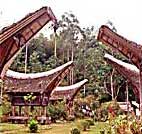 The world's largest archipelago [13,677
islands], Indonesia has a
huge variety of
wonderful landscapes, from the terraced rice
paddies of Bali to the forests of Sumatra;
bizarre and diverse cultures and traditions
from the primitive Dani folk [picture above
right] to the weird Torajah area [picture
above left]; but always calm, friendly people,
wonderful food, diverse wildlife, and plenty
of activities. The world's largest archipelago [13,677
islands], Indonesia has a
huge variety of
wonderful landscapes, from the terraced rice
paddies of Bali to the forests of Sumatra;
bizarre and diverse cultures and traditions
from the primitive Dani folk [picture above
right] to the weird Torajah area [picture
above left]; but always calm, friendly people,
wonderful food, diverse wildlife, and plenty
of activities.
There are loads of gorgeous, stylish, little
ethnic hotels and restaurants, and prices are
reasonable.Land crossing:
Entikong West
Kalimantan Sarawak
border).
Java and Bali are two of Indonesia's more
pleasant islands, though the classic chill-out
island is of course the tranquil, Hindu Bali
that offers spirituality, beaches with warm
waters, around 20,000 wonderful temples,
endless festivals, amazing funerals, terraced
rice fields, volcanoes, terrific cuisine and
friendly, relaxed people. Kuta and Legian are
the island's most famous beaches.
Muslim Java is altogether busier and less
beautiful, particularly the unattractive
capital of Jakarta, though Borobudur is worth
an effort to see. Bali was bombed twice, in
2002 and 2005 so you might care to check with
a travel advisory before buying your ticket.
For real, off-planet weirdness see Bugbog's
other Indonesia pictures of Sulawesi and Irian
Jaya.
The best time to be in tropical Indonesia is
in the dry season April - September. Other
months may have rains, wind, rough seas,
seaweedy sand and oppressive humidity.
Health
Regulations:Officially there are no vaccinations required.
Malaria prophylactics is recommended as well
as having a tetanus and polio booster if
necessary. Electricity 220 V AC.
Clothing:During the day it is recommended light cotton
clothes. For mountain excursions you should
take along some warmer clothes.
Customs and
Traditions:Shorts and mini-skirts are not allowed in and
around temples. It is a custom to take off the
shoes in temples, on festival grounds and in
private houses. It is strongly recommend
following these custom to show your respect
for the religious traditions.You should
never touch someone's head (including
children) or point your finger at someone as
this is considered impolite. For the same
reason you should avoid standing with your
head above someone you are talking to. In
doubt you should rather squat or sit.
Shaking hands
is not customary, except on farewells or
congratulations. Intimate touches or embraces
are absolutely inappropriate.
Nude or
topless swimming and sunbathing is forbidden.
If you see Balinese taking a bath in the
rivers along the streets you should discreetly
overlook them and resist the appeal to take
pictures.
When handing
over or taking something from someone only the
right hand is to be used. The left hand is
considered unclean.
The Balinese
love to bargain, especially in the markets,
where it is is usual to haggle over the
prices. You can do so too but, so as not to be
disappointed, please inform yourself in
advance about the realistic prices.
Attending
Ceremonies:Remember these are serious occasions and
should be treated as such.
Religious
Guidelines:Always wear a sarong and sash. Do not walk in
front of people praying. Do not use flash
cameras or push your camera into the priest's
face. Never sit higher than the priests or the
offerings.
At cremation,
do not get in the way of the attendees -
however important that photographic
opportunity is.
Women are not
allowed to enter temples during menstruation.
When
attending special ceremonies or anniversary
celebrations, as a guest or onlooker, small
donations are gratefully received. Your
donations will help in paying for the
offerings and upkeep of the temple.
|